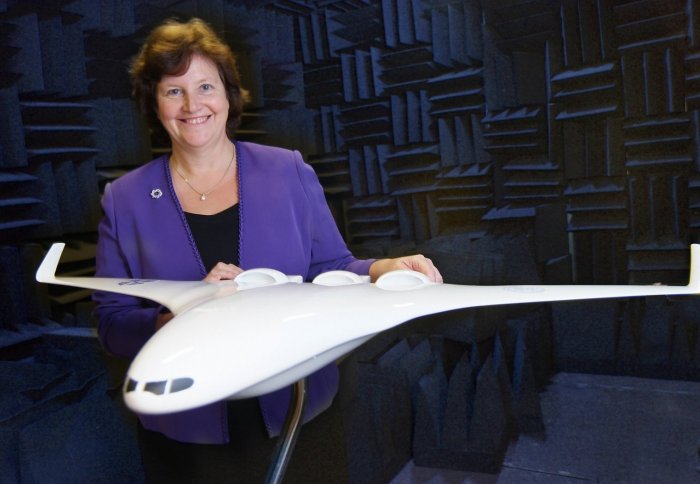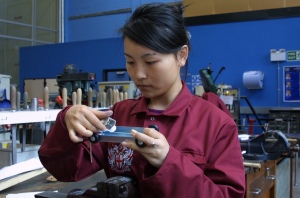Towards a Silent Aircraft: Ann Dowling to deliver Imperial's Athena Lecture

Professor Dame Ann Dowling, President of the Royal Academy of Engineering, will give the College's annual Athena lecture next week.

Credit: University of Cambridge, Department of Engineering
A world authority on aircraft noise and one of the UK’s most eminent engineers, Professor Dowling is Professor of Mechanical Engineering at the University of Cambridge, where she was Head of the Department of Engineering from 2009 to 2014.
In 2006 she led the pioneering Silent Aircraft Initiative, a collaboration between researchers at Cambridge and MIT, in the development of a revolutionary concept for an aircraft which makes virtually no sound.
In her lecture, Towards a Silent Aircraft, Professor Dowling’s will describe her career fusing engineering research with industrial practice and the ways in which noise is being reduced in the development of next-generation aircraft.
She is the fifteenth speaker to deliver the Athena Lecture, which is given annually by a prominent female scientist to celebrate the achievements of women in science, technology, engineering and medicine.
Ahead of the lecture, Professor Dowling shares some of her insights.
Tell us about your current research
Much of my current research is linked to reducing the noise made by aircraft. Airplanes are considerably quieter now than they used to be, but the noise during take-off and landing is still a major societal concern.
At the moment we’re looking at chevrons, and how they affect the noise of jet engines. Chevrons are the zig-zag edges you can see on the back of most plane engines. They help reduce the noise of the engine, but until now working out which shape works best has involved building and testing lots of different designs which is very expensive and time consuming.
We’ve been developing a model which can predict quickly the effect that different shapes and sizes of chevrons will have on aircraft noise, which we hope will make the process much faster and more efficient and enable chevrons and similar designs to be optimised.
What inspired you to pursue a career in this field?
I’ve always been really interested in how things work. I also find real joy in puzzling things out and finding a solution to a problem for the very first time.
There are still not enough girls taking A-level physics - a major gateway to engineering.
– Professor Ann Dowling
Following my undergraduate degree in mathematics, I had a summer job at the Royal Aircraft Establishment. At the time, Concord was doing its test flights and there was concern that it wouldn’t be allowed to land in the US because of the noise it made.
Aircraft noise was becoming an increasingly important issue, and I saw huge opportunities to make a difference there. It was this that really inspired me to take the leap into engineering and follow a PhD in aircraft noise.
Do you think we’ll soon see a silent aircraft?
Much of my current research looks at how we might make conventional-looking aircraft quieter, however to make a truly radical difference we have to go back to the drawing board.
For the Silent Aircraft Initiative we started with a blank piece of paper, and made noise reduction a central focus. We eventually developed a conceptual blended-wing design – a bat shaped aircraft with the engines mounted on top so that the noise is shielded from people on the ground.
It will be a long time before that kind of aircraft becomes mainstream, but the project generated a number of noise mitigation ideas that may have applications sooner.
How have things changed for women in engineering since you started your career?
There are certainly a lot more female engineers around now than there were when I started my career, though still only 7% of engineering professionals in the UK are female, which is a terribly low number.
There are now lots of initiatives in schools to encourage school children to think of engineering careers. But we also need to retain the women engineers we have. The Royal Academy of Engineers is trying to tackle this through its Diversity Leadership Group. We’re working with many different employers in industry to help them remove barriers and support all their staff, female and male, to ensure that they reach their potential.
Why do you think the number of female engineers is so low?

Professor Dowling is working to promote women in engineering
The sticking point is that there are still not enough girls taking A-level physics - a major gateway to engineering. They’re making these important decisions very young, before they necessarily have decided what kind of job they want to do. It’s crucial that they receive the right support if they’re not to miss out on the opportunities that pursuing these academic subjects leads to in later life.
Another key problem is that not many young people understand what a career in engineering entails. If you google “engineer” virtually all pictures that come up are of people wearing hard hats. I certainly never wear a hard hat in my job! Engineering covers such a spectrum of fields – from designing airplanes, to information technology,, to developing new materials or sustainable energy, to working out new ways to deliver medicines around the body. We need to do more to highlight the breadth of opportunities on offer to young people.
Do you have any advice for young female engineers today?
The first thing I’d say is that you’ve made a fantastic career choice. It’s a job that can offer immense variety and endless opportunities – as I’ve found. In that respect, I suppose my advice would be to take every opportunity you can and make it count.
- Professor Dowling's lecture will take place on 17 June, 12:30 - 14:30. Register for the event online.
Credit (Top image): University of Cambridge, Department of Engineering
Article text (excluding photos or graphics) © Imperial College London.
Photos and graphics subject to third party copyright used with permission or © Imperial College London.
Reporter
Deborah Evanson
Communications Division